|
Leadership tussle over:
UNP supporters call upon leaders to work together
Jaliya Wijeyekoon
The United National Party (UNP) the second oldest political party in
the country and formed by the first Prime Minister of Ceylon, D.S.
Senanayake who ruled our country for over 30 years under different
leaders since independence.
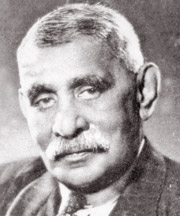
D.S. Senanayake |
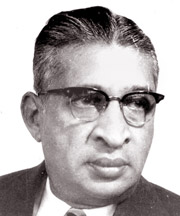
Dudley Senanayake |
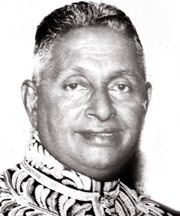
Sir John Kotelawala |
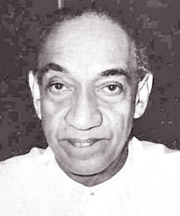
J.R. Jayewardene |
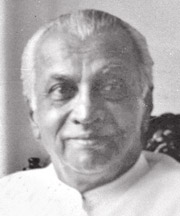
D.B. Wijethunga |
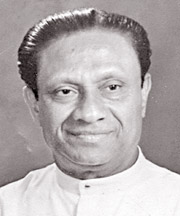
R. Premadasa |
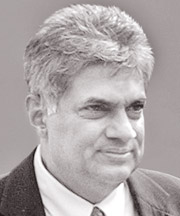
Ranil Wickremesinghe |
Great visionary
D.S. Senanayake who had a great vision for the country initiated a
number of mega development projects to uplift the socio-economic
standards of the people. The greatest achievement during his tenure of
office was winning independence from colonial rule.He was well poised to
lead the country towards a brighter future when he met a sudden death,
falling off his horse while on his regular exercises at Galle Face
Green.
After the death of D.S. Senanayake, his eldest son Dudley Senanayake,
who was then Minister of Agriculture in the Cabinet was appointed Prime
Minister by Lord Soulbury, the then Governor of independent Ceylon over
an understanding he had with D.S. Senanayake prior to his untimely
demise.
Mild-mannered politician
Dudley Senanayake, a Cambridge scholar became the UNP leader as well,
and guided the party and won the subsequent election held in 1953 with a
two-third majority and was unanimously elected as the Prime Minister for
a second consecutive term.
However, with the passage of time, his second term turned out to be a
bit troublesome with conflicts and differences of opinion on various
issues among his own party stalwarts S.W.R.D. Bandaranaike broke away
from the party and formed the MEP while Sir John Kotelawala targetted
the prestigious position of Prime Minister and the leadership of the
party. Dudley, a mild-mannered leader stepped down from the leadership
and politics, paving the way for Sir John to take over the reins of the
party.
Military figure
Sir John Kotelawala who was more of a military personality was not a
successful party leader and the UNP was swept out of power at the next
election. Sir John never returned to politics and lived in isolation the
rest of his life following the debacle suffered by the party under his
leadership.
Dudley Senanayake and J.R. Jayewardene got together and reorganised
the party and came into power again on two occasions under the former’s
leadership, but not without conflicts which they sorted out amicably.
Dudley Senanayake passed away in 1973 and undisputed Deputy Leader
J.R. Jayewardene took over the reins of the party and revolutionised the
organisation mechanism of the party and led it to a historic five-sixth
victory at the 1977 general election.
Shrewd leader
Jayewardene commanded the respect of all and nobody dared challenge
his leadership until he completed his second term. A number of changes
took place in the socio-economic sphere and in the lives of people
during his tenure as the first Executive President of Sri Lanka.
Fomer president Jayewardene also had differences of opinion with some
of his ministers during the latter part of his second term, but no one
openly challenged him except Gamini Jayasooriya who relinquished his
portfolio over the disagreement he had with Former president Jayewardene
over the Indo-Lanka Peace Accord.
Jayewardene groomed two of his able lieutenants to take over the
party leadership after his retirement.
However, Ranasinghe Premadasa was also preparing himself as a
formidable force and finally JR had to give way to R. Premadasa as he
had made all infrastructure requirements with the majority membership
support.
However, within a short period of time, Premadasa had to face grave
problems from all quarters. The LTTE was in full swing in the North
while the JVP was involved in the height of its terror activities
indiscriminately killing forces personnel, politicians, artistes, and
even members of the Buddhist clergy who aired their views against the
JVP movement.
Impeachment motion
In addition to these two burning catastrophies, Premadasa was
confronted by another internal conflict orchestrated by his own party
stalwarts with the support of the opposition, the Impeachment Motion.
Premadasa, though not a scholar was a veteran practical politician who
had gone through the mill.
He immediately prorogued Parliament and handled the situation in such
a manner that some of the party members who had signed the impeachment
motion withdrew their signatures. President Premadasa sailed through
turbulent waves and reached the shore safely.
He was assassinated on May 1, 1993 and D.B. Wijethunga, who was then
Prime Minister became the President and Ranil Wickremesinghe was
appointed Prime Minister.
Wickremesinghe was the chief architect in handling the transition of
power following the sudden death of President Premadasa and his action
was lauded by world leaders. In similar situations in other countries
there had been mass scale bloodshed and chaotic situations for days.
That was the first instance in which Wickremesinghe displayed his
statesmanship to the world which was appreciated by all.
However, with the untimely death of President Premadasa, the UNP
became slightly demoralised and the People’s Alliance was gaining ground
in the political sphere with the entry of Chandrika Kumaratunga into
active politics.
President Wijethunga dissolved Parliament in 1993 and went for an
election six months prior to the scheduled date and lost it by one
majority vote in the house.
Dramatic changes
Gamini Dissanayake, who had broken away from the UNP and formed the
DUNF, had rejoined the party by that time, and wanted to form a
government with the support of A.H.M. Ashroff. However, Wickremesinghe
gracefully bowed down to the people’s verdict and resigned from the
Premiership and left temple trees peacefully.
However, there were many dramatic changes and unfortunate incidents
in the party and among some party stalwarts, and finally the party
leadership was thrust upon Ranil Wickremesinghe. He formed a government
in 2001 with the able assistance of a PA breakaway group, headed by SLFP
General Secretary S.B. Dissanayake.
However, he was unable to consolidate and continue in power due to a
variety of reasons. It is accepted even by Wickremesinghe’s opponents
that he possesses an ocean of knowledge in Parliamentary affairs,
national and international politics, bilateral and multilateral issues
and can get on to any international forum.
But according to some party representatives he will never rise to
become the national leader since he is not a practitional politician who
comprehends the pulse of the masses of the country.
Presidential election in 2010 followed by the General election where
the United National Party suffered a humiliating defeat saw a number of
developments against the leadership of Ranil Wickremesinghe.
Some vociferous young UNP Parliamentarians openly challenged the
leadership over the defeat and some even went to the extent of saying
that the UNP would never achieve any victory under the present
leadership.
Sajith Premadasa, the son of former President Ranasinghe Premadasa,
was a key figure who challenged the leadership over the debacle of the
party at the last few elections.
The United National Party has been virtually divided into two groups
during the past few months owing to the leadership tussle.
One of the main allegations levelled against the incumbent leader
was, that democracy is not maintained in the party and that electing
office bearers should be done on a more democratic manner.
After a long period of unrest and clamour, the party hierarchy
appointed a committee to look into the matters. Various suggestions and
proposals were accepted from different quarters of the party and they
were officially ratified at the eagerly anticipated convention which was
held on December 12 2010.
A decision was taken at the convention to appoint all office bearers
of the party through the secret ballot of the sitting Parliamentarians
and the Executive committee members in the absence of a consensus for
such posts.
The UNP gained a new lease of life with the convention and mainly
Sajith Premadasa’s supporters were overjoyed with some ratification
adopted at the convention.
Immediately after the annual convention, the UNP became heavily
involved in the LG Polls and everybody was equally busy during the last
few months. Wickremesinghe and Premadasa went round the country and
launched an aggressive campaign, but ended up losing power even in some
of the local bodies that were under their wings.
The UNP’s main argument is that they have increased the percentage of
votes at the recently concluded LG Polls in comparison to the last
Presidential and General elections.
The UNP membership was more interested in choosing a new leader and
Premadasa’s supporters were making various remarks even on the LG Polls
platforms. Press conferences and TV discussions were full of Premadasa
supporters while Wickremesinghe was mute as usual with regard to the
leadership issue.
Soon after the LG polls were over, the UNP decided to select their
new office bearers and an executive committee meeting was convened at
the party headquarters on March 19. There had been a prolonged
discussion where no final decision was taken except for arriving at a
conclusion to select the leader with the consensus of the membership.
During the past few weeks, all UNP stalwarts and supporters had had
closed door discussions in various venues to arrive at an amicable
settlement to this all important issue without jeopardising the party
further.
Last Wednesday evening they met again at the party headquarters and
elected their office bearers unanimously to the surprise of the public.
Ranil Wickremesinghe remained as the party leader while a new Co-Deputy
leader post was created. Sajith Premadasa accepted the position which
has a wide variety of powers confered around it.
Now the leadership tussle of the party is over and the party
membership is anxiously waiting to see how all these leaders work as one
unit to bring back the lost glory of the grand old party and to win a
future election.
It is quite evident that there were a number of forces who worked to
consolidate this position and arrive at this amicable settlement. And it
is the prime duty of both the leaders to mutually respect each other and
work with determination, leaving aside petty differences for the sake of
disgruntled membership.
Party supporters in all four corners of the country now expect both
groups to work as one unit maintaining absolute discipline to regain the
party’s former glory. |

